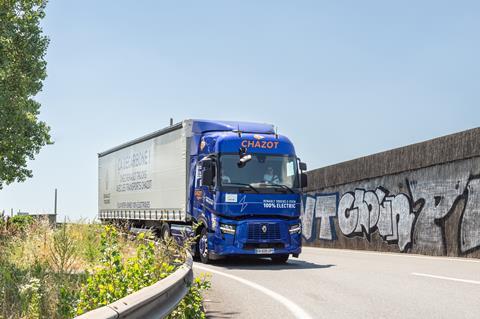Renault Trucks is intensifying its efforts to decarbonise transport by electrifying its internal logistics. The first phase involves electrifying the axle transport between its Lyon and Bourg-en-Bresse plants, with five Renault Truck E-Tech T electric vehicles set to cover the 450,000 kilometers driven annually between the two sites.

Renault Trucks is applying its own solutions to its internal operations using its electric heavy-duty trucks for inter-regional distribution. Specifically, the E-Tech T 4x2 tractors will now be used for axle supply to the Bourg-en-Bresse plant. Over the next six years, two partner hauliers, Dupessey & Co and Transports Chazot, will manage the contract.
Five electric trucks, each carrying 22 tonnes of equipment, will make two round trips per day (totaling 360 kilometers) to deliver axles from Lyon to Bourg-en-Bresse, where the trucks are assembled. Depending on the flow of goods, the number of deliveries may increase, with up to seven trucks operating in a single day. These trucks will require a 45-50 minute interim charge once a day at a specially set up Charging station in Lyon and will be charged every evening at the hauliers’ depots. This initiative will cover 440,000 kilometers with electric vehicles, saving 375 tonnes of co2 annually.
The electrification project at Renault Trucks is designed to showcase the decarbonised transport solutions it offers to its customers. To ensure feasibility, Renault Trucks used its “Range Simulator” software to determine the necessary charging requirements based on truck use, load, equipment, outside temperature, and topography. Consequently, two 360kW terminals, each with two charge points, have been installed at the Saint-Priest production site for optimal interim charging.
Bruno Blin, President of Renault Trucks, stated, “We’ve worked long and hard to electrify this first logistics route, having chosen axles between Lyon and Bourg-en-Bresse because this is a flow that is emblematic of Renault Trucks’ business, with very high operational constraints, particularly in terms of output and precision. The launch of this project is a further illustration of our expertise in decarbonising mobility.” Renault Trucks aims to electrify all logistics flows between its production sites by 2030, creating a new transport model.
The company is also working on electrifying around a dozen other logistics flows, expected to become operational in the coming months and years. This will be facilitated by a system of relay vehicles, enabling electric trucks to cover increasingly longer distances.













